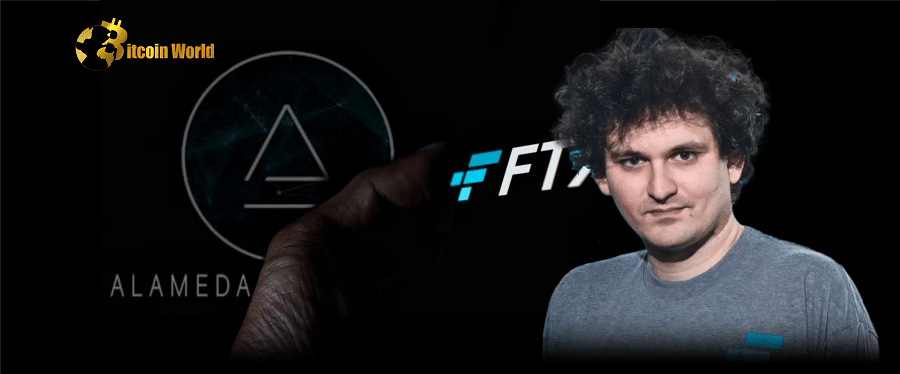The FTX saga continues to unravel, revealing a complex web of financial dealings that led to the exchange’s dramatic collapse. One of the latest revelations involves the intriguing purchase of Robinhood shares by FTX founder Sam Bankman-Fried (SBF), using funds from Alameda Research, FTX’s sister trading firm. But this isn’t just a simple investment story – it’s a tale of borrowed money, pledged collateral, and a looming legal fight over millions of dollars worth of stock. Let’s dive into the details of this unfolding crypto drama.
The $546 Million Robinhood Stake: How Was it Funded?
According to an affidavit filed by SBF himself, the purchase of a 7.6% stake in popular brokerage app Robinhood was financed through a hefty loan of $546 million. But where did this money come from? The answer lies within the FTX ecosystem – from Alameda Research.
Here’s a breakdown of the key points:
- Source of Funds: Alameda Research, the trading firm closely linked to FTX, provided the funds.
- Loan Amount: A staggering $546 million was borrowed by SBF and FTX co-founder Gary Wang.
- Purpose of Loan: To acquire Robinhood shares through a shell company named Emergent Fidelity Technologies Ltd.
- Timing: The loans were issued via four promissory notes between April and May.
- Breakdown of Loans:
- April 30: $316.6 million and $35.1 million loans
- May 15: $175 million and $19.4 million loans
The Robinhood Shares as Collateral: A Risky Move?
The plot thickens when we learn that these very Robinhood shares, acquired with borrowed Alameda funds, were later used as collateral. For what? Another loan, this time from crypto lender BlockFi.
Let’s understand why this is significant:
- Collateral Usage: The Robinhood shares became collateral for a loan from BlockFi.
- Lender: BlockFi, another crypto company that has faced its own financial challenges.
- Potential Conflict: BlockFi is now among the entities claiming ownership of these Robinhood shares, leading to a legal dispute.
- Timeline: The shares were allegedly pledged as collateral to BlockFi on November 9.
Why Does This Loan Disclosure Matter Now?
The revelation of these loans and the use of Robinhood shares as collateral adds another layer of complexity to the already convoluted FTX bankruptcy proceedings. It also directly impacts the ongoing legal battle for control of these shares.
Here’s why this disclosure is crucial:
- Legal Complications: The disclosure intensifies the legal fight over the 56 million Robinhood shares, currently valued at around $430 million.
- Conflicting Claims: BlockFi is suing for the Robinhood shares, asserting they were pledged as collateral.
- Bankruptcy Implications: The ownership of these assets needs to be determined as part of the FTX and BlockFi bankruptcy cases.
- Transparency Concerns: It raises further questions about the financial dealings between FTX, Alameda Research, and SBF, highlighting a lack of transparency and potential mismanagement of funds.
The Bigger Picture: What Does This Tell Us?
This situation underscores the interconnectedness and inherent risks within the cryptocurrency ecosystem. The actions of key players like SBF and the intricate financial relationships between companies like FTX, Alameda, and BlockFi have had far-reaching consequences.
Key takeaways from this revelation:
- Intertwined Finances: It reveals the deeply intertwined financial operations between FTX and Alameda Research, blurring the lines between customer funds and company investments.
- Risk Management Failures: The use of borrowed funds for speculative investments like Robinhood shares, and then further leveraging them as collateral, points to significant risk management failures.
- Impact on Crypto Industry: This saga further erodes trust in the crypto industry and highlights the need for greater regulation and transparency.
- Lessons for Investors: It serves as a stark reminder of the volatility and risks associated with cryptocurrency investments and the importance of due diligence.
What’s Next for the Robinhood Shares?
The fate of the Robinhood shares remains uncertain and will be decided through the legal proceedings. The battle for these assets is likely to be protracted and complex, involving multiple stakeholders and legal jurisdictions.
The key questions moving forward are:
- Who legally owns the shares? Will it be BlockFi, FTX creditors, or another party?
- How will this impact FTX and BlockFi bankruptcy proceedings? Will it complicate or expedite the resolution?
- What are the broader implications for crypto regulation? Will this case spur stricter oversight of crypto exchanges and lending platforms?
In Conclusion: A Tangled Web of Crypto Finance
The story of SBF’s Robinhood share purchase, funded by Alameda and used as BlockFi collateral, is a microcosm of the larger FTX collapse. It exposes the risky financial practices, lack of transparency, and interconnectedness that contributed to the downfall of a crypto empire. As the legal battles unfold, this case will undoubtedly set precedents and shape the future landscape of cryptocurrency regulation and investor protection. The Robinhood riddle is just one piece of the puzzle in the ongoing FTX saga, but it’s a crucial piece that highlights the intricate and often opaque world of crypto finance.
Disclaimer: The information provided is not trading advice, Bitcoinworld.co.in holds no liability for any investments made based on the information provided on this page. We strongly recommend independent research and/or consultation with a qualified professional before making any investment decisions.


